Leviticus 6 meaning explained in AI Summary
The Burnt Offering Continued
- Maintaining the Fire: This chapter revisits the burnt offering, emphasizing the importance of keeping the fire on the altar burning continually. This symbolized God's ever-present nature and the need for constant worship and devotion.
- Priestly Duties: The priests were specifically tasked with tending the fire on the altar, ensuring a steady flame throughout the day and night. This responsibility highlighted their role as intermediaries between God and the people.
- Variations of the Offering: While the core requirements for the burnt offering remain the same, this chapter mentions variations based on the type of animal sacrificed. Specific instructions are given for burnt offerings of birds.
Chapter 6 of Leviticus continues outlining God's laws for the Israelites, focusing on instructions for various offerings and the responsibilities of priests.
1. Laws Concerning Offerings (6:1-7)
- Guilt Offering for Unintentional Sins (6:1-7): This section addresses unintentional sins against God or others, like keeping something that belongs to another person. The guilty party must confess, make restitution (plus 20%), and offer a ram as a guilt offering.
2. Instructions for Priests (6:8-30)
- Maintaining the Altar Fire (6:8-13): The priests are commanded to keep the altar fire burning continuously, symbolizing God's constant presence.
- The Grain Offering (6:14-18): Instructions are given for the daily grain offering made by the priests, emphasizing its sacredness.
- The Sin Offering for Priests (6:19-23): This details the procedure for a sin offering if a priest sins unintentionally, highlighting their accountability before God.
- The Guilt Offering for Priests (6:24-30): Similar to the previous section, this outlines the process for a priest's guilt offering if they unknowingly misuse something consecrated to God.
3. Laws Concerning Offerings (6:31-7:10)
- The Memorial Portion (6:31-33): This section explains that the priests receive a portion of the grain offering as their sustenance.
- The Sin Offering (7:1-10): This passage reiterates and expands on the laws regarding the sin offering, including where it should be eaten and who can partake.
Key Themes in Leviticus Chapter 6:
- Holiness and Purity: The chapter emphasizes the importance of maintaining ritual purity and seeking atonement for sins, both intentional and unintentional.
- God's Presence: The continuous fire on the altar symbolizes God's constant presence among his people.
- Accountability and Restitution: The laws regarding guilt offerings highlight the importance of taking responsibility for one's actions and making amends for wrongdoing.
- The Role of the Priests: The chapter underscores the priests' crucial role in mediating between God and the people through offerings and maintaining the sanctity of the tabernacle.
Overall, Leviticus Chapter 6 provides detailed instructions for specific offerings and emphasizes the importance of seeking atonement, maintaining ritual purity, and acknowledging God's presence in the lives of the Israelites.
Leviticus 6 bible study ai commentary
Leviticus 6 shifts focus from the instructions for the worshipper to the specific duties of the priests in handling the sacrifices. It begins by concluding the law of the guilt offering, uniquely tying social justice (restitution for fraud) directly to worship. The remainder of the chapter provides the procedural liturgy for the priests regarding the burnt, grain, and sin offerings, emphasizing the perpetual nature of worship, the sacredness of the offerings, and the strict protocols required within God's holy presence. The central theme is priestly responsibility in mediating between a holy God and a sinful people through the precise administration of the sacrificial system.
Leviticus 6 context
The setting is the foot of Mount Sinai, where God is giving Israel the laws for their covenant community centered around the Tabernacle. These laws established Israel's distinct identity, contrasting with their Egyptian past and the Canaanite cultures they would soon encounter. This chapter specifically moves into the priestly torah, the instructions for the ministers of the sanctuary. A crucial literary detail is that the Hebrew (Masoretic) text begins chapter 6 at what is verse 8 in English Bibles. Verses 1-7 in English are the end of chapter 5 in the Hebrew text, logically completing the section on the guilt offering before a new section of priestly duties begins. This analysis will follow the English chapter 6 structure.
Leviticus 6:1-7
And the Lord spoke to Moses, saying, “If anyone sins and commits a breach of faith against the Lord by deceiving his neighbor in a matter of deposit or security, or through robbery, or if he has oppressed his neighbor or has found something lost and lied about it, swearing falsely—in any of all the things that people do and sin thereby—if he has sinned and has realized his guilt and will restore what he took by robbery or what he got by oppression or the deposit that was committed to him or the lost thing that he found or anything about which he has sworn falsely, he shall restore it in full and shall add a fifth to it, and give it to him to whom it belongs on the day he realizes his guilt. And he shall bring his guilt offering to the Lord, a ram without blemish out of the flock, or the equivalent, for a guilt offering to the priest. And the priest shall make atonement for him before the Lord, and he shall be forgiven for any of the things that one may do and thereby become guilty.”
In-depth-analysis
- "Commits a breach of faith against the Lord": The Hebrew
ma'al ba'Adonaisignifies treachery or sacrilege against God Himself. This phrase powerfully elevates sins between people—deception, theft, extortion—into offenses against God's own holiness and authority. Social ethics are theological. - Word -
Nefesh(Soul): The phrase "if a soul sins" (v. 2, KJV) or "if anyone sins" emphasizes that sin is a personal act involving the whole person, not merely a legal infraction. - Restitution as a Prerequisite: Unlike other offerings, the guilt offering (
'asham) for these sins demands that restitution to the wronged party happen first. The sinner must restore the principal amount plus a 20% penalty. Reconciliation with one's neighbor is a necessary precursor to reconciliation with God. - Realizing Guilt: The process begins "on the day he realizes his guilt" (v. 5). Atonement follows confession and the tangible act of making things right.
Bible references
- Lk 19:8: "...If I have defrauded anyone of anything, I restore it fourfold." (Zacchaeus's repentance exemplifies and exceeds the spirit of this law).
- Matt 5:23-24: "So if you are offering your gift at the altar and there remember that your brother has something against you, leave your gift there... First be reconciled to your brother, and then come and offer your gift." (Jesus affirms the principle of horizontal reconciliation before vertical worship).
- Num 5:7: "...he shall confess his sin that he has committed. And he shall make full restitution...and add a fifth to it..." (A parallel law for breach of faith, underscoring the principle).
Cross references
Eze 33:15 (restitution as evidence of repentance), Col 3:25 (divine justice for wrongdoing), Exo 22:1-15 (civil laws on restitution), Eph 4:28 (theft replaced by honest labor and charity).
Polemics
Unlike Ancient Near Eastern law codes (e.g., Hammurabi's Code) that treated theft and fraud primarily as property crimes punishable by fines or physical retribution, Leviticus frames them as violations of the divine covenant. The requirement of a sacrifice in addition to restitution highlights that the sin fractured not just a social bond but a sacred one. God is the ultimate injured party.
Leviticus 6:8-13
The Lord spoke to Moses, saying, “Command Aaron and his sons, saying, This is the law of the burnt offering. The burnt offering shall be on the hearth on the altar all night until the morning, and the fire of the altar shall be kept burning on it. And the priest shall put on his linen garment and put on his linen undergarment next to his body, and he shall take up the ashes to which the fire has consumed the burnt offering on the altar and put them beside the altar. Then he shall take off his garments and put on other garments and carry the ashes outside the camp to a clean place. The fire on the altar shall be kept burning on it; it shall not go out. The priest shall burn wood on it every morning, and he shall arrange the burnt offering on it and shall burn on it the fat of the peace offerings. Fire shall be kept burning on the altar continually; it shall not be put out.”
In-depth-analysis
- Shift in Audience: The instruction changes from "if anyone" to "Command Aaron and his sons." This section is specifically for the priests.
- The Perpetual Fire (
ʼesh tamid): The fire on the bronze altar was to never be extinguished. This symbolized:- God's constant presence and availability to receive worship.
- The unceasing need for atonement.
- God's enduring holiness and judgment against sin.
- Priestly Garments and "Holiness Gradient":
- Sacred Duty: For handling the ashes on the altar, the priest wore special linen garments, which were reserved for holy tasks and symbolized purity.
- Mundane Duty: To carry the ashes outside the camp, he changed into his "other" (ordinary) garments. This demonstrates a clear separation between the holy space of the altar and the area outside the camp. Holy things are handled with holy attire.
- The Altar Hearth: The Hebrew (
mowqedah) refers to the burning pile or pyre itself, emphasizing the location of this continuous burning.
Bible references
- Heb 7:25: "Consequently, he is able to save to the uttermost...since he always lives to make intercession for them." (Christ's constant intercession is the ultimate fulfillment of the perpetual fire and offering).
- Rev 8:3: "...An angel came and stood at the altar with a golden censer, and he was given much incense to offer with the prayers of all the saints on the golden altar before the throne..." (The imagery of the heavenly altar draws directly from this Tabernacle practice).
- Lev 9:24: "And fire came out from before the LORD and consumed the burnt offering...on the altar..." (The initial fire was divine; the priests' duty was to maintain what God started).
Cross references
Exo 27:1-8 (construction of the altar), Exo 29:38-42 (the daily offering), Heb 9:24 (Christ's entry into the true sanctuary), 1 Pet 2:5 (believers as a spiritual house).
Leviticus 6:14-18
“And this is the law of the grain offering. The sons of Aaron shall offer it before the Lord in front of the altar. And one shall take from it a handful of the fine flour of the grain offering and its oil and all the frankincense that is on the grain offering and burn it on the altar as a memorial portion with a pleasing aroma to the Lord. And the rest of it Aaron and his sons shall eat. It shall be eaten unleavened in a holy place. In the court of the tent of meeting they shall eat it. It shall not be baked with leaven. I have given it as their portion from my food offerings. It is a thing most holy, like the sin offering and the guilt offering. Every male among the children of Aaron may eat of it..."
In-depth-analysis
- "Most Holy" (
qodesh qodashim): This designation elevated the grain offering to the highest level of sanctity. This status dictated how it must be handled, where it could be eaten (only in the holy courtyard), and by whom (only the male priests). - Memorial Portion (
'azkarah): A portion was burned on the altar "to bring to remembrance" God's provision and covenant. The pleasing aroma represented the acceptance of the whole. - Priestly Provision: The remainder of the offering was the priests' food. It was their "portion" for their service at the sanctuary.
- Unleavened: The prohibition of leaven, a common symbol of sin and corruption in the Bible, reinforced the purity required in God's presence.
Bible references
- 1 Cor 9:13: "Do you not know that those who are employed in the temple service get their food from the temple, and those who serve at the altar share in the sacrificial offerings?" (Paul uses this principle to defend the right of gospel ministers to receive material support).
- Heb 13:10: "We have an altar from which those who serve the tabernacle have no right to eat." (The author contrasts the physical eating by Levitical priests with the spiritual partaking of Christ, the new altar and sacrifice).
- 1 Cor 5:8: "Let us therefore celebrate the festival, not with the old leaven, the leaven of malice and evil, but with the unleavened bread of sincerity and truth." (The symbolism of leaven is explicitly defined in the New Testament).
Cross references
Lev 2:1-3 (rules for laypeople bringing this offering), Num 18:9-10 (priestly portions detailed), Eze 44:29 (prophetic vision of priests eating offerings).
Leviticus 6:19-23
The Lord spoke to Moses, saying, “This is the offering that Aaron and his sons shall offer to the Lord on the day when he is anointed: a tenth of an ephah of fine flour as a regular grain offering, half of it in the morning and half in the evening. It shall be made with oil on a griddle...it is a grain offering of the priest that shall be wholly burned. It shall not be eaten.”
In-depth-analysis
- Priest's Own Offering: This is a special grain offering made by the High Priest, beginning on the day of his ordination and continuing daily.
- Wholly Burned: This is the critical distinction. When a layperson brought a grain offering, the priests ate most of it. But when a priest offered one for himself, he could not partake. It had to be completely consumed on the altar.
- Symbolic Meaning: This signified that the priest could not profit from his own atonement or dedication. His service was wholly devoted to God, without personal benefit derived from his own offering. It prevented any conflict of interest and represented total consecration.
Bible references
- Heb 7:27: "[Christ] has no need, like those high priests, to offer sacrifices daily, first for his own sins and then for those of the people..." (Contrasts Jesus' perfect, one-time sacrifice with the High Priest's required daily offering for himself).
- Heb 5:3: "Because of his weakness he is obligated to offer sacrifice for his own sins just as he does for those of the people." (Explains the need for the human high priest to make offerings for himself, a necessity Christ did not have).
Cross references
Exo 29:1-2 (anointing and ordination ceremony), Lev 8:26 (ordination offering), Heb 9:25 (Christ did not need to offer himself repeatedly).
Leviticus 6:24-30
The Lord spoke to Moses, saying, “Speak to Aaron and his sons, saying, This is the law of the sin offering. In the place where the burnt offering is killed shall the sin offering be killed before the Lord; it is most holy. The priest who offers it for sin shall eat it... Whatever touches its flesh shall be holy... But no sin offering shall be eaten from which any blood is brought into the tent of meeting to make atonement in the Holy Place; it shall be burned in the fire.”
In-depth-analysis
- Contagious Holiness: This passage uniquely details a principle where holiness is "transferred" by contact. Anything that touched the flesh of the "most holy" sin offering became holy itself.
- Purifying Vessels: The rule about the pots illustrates the indelibility of this transferred holiness.
- Earthenware: Porous and absorbent, it could not be cleansed and had to be broken.
- Bronze: Non-porous, it could be scoured and rinsed, cleansing it for reuse.This demonstrates the penetrating and permanent nature of God's holiness.
- Priest Bearing Iniquity: When the priest ate the sin offering, it was a symbolic act of taking the sinner's guilt upon himself to bear it away.
- The Major Exception (v. 30): A sin offering whose blood was taken inside the Tent of Meeting (for atonement for the nation or a priest, as on the Day of Atonement) could not be eaten. It was too holy. It had to be entirely burned outside the camp.
Bible references
- Heb 13:11-12: "For the bodies of those animals whose blood is brought into the holy places...are burned outside the camp. So Jesus also suffered outside the gate in order to sanctify the people through his own blood." (This is a direct and profound typological fulfillment of verse 30).
- 2 Cor 5:21: "For our sake he made him to be sin who knew no sin, so that in him we might become the righteousness of God." (Reflects the principle of the substitute bearing the sin, as the priest did symbolically by eating the offering).
- Hag 2:12: "'If someone carries holy meat in the fold of his garment and touches with his fold bread or stew or wine or oil or any kind of food, does it become holy?' The priests answered and said, 'No.'" (Shows a limit to contagious holiness; it doesn't chain-react. This contrasts with uncleanness, which is more contagious).
Cross references
Lev 4:1-35 (rules for sin offerings), Lev 10:17 (Aaron corrected for not eating a sin offering), Lev 16:27 (Day of Atonement offering burned outside the camp).
Leviticus chapter 6 analysis
- Priestly Torah: The chapter's primary theme is providing the "handbook" for the priests. While earlier chapters instructed the layperson what to bring, this chapter instructs the priest how to officiate, emphasizing precision and reverence.
- Atonement & Reconciliation Model: The chapter presents a holistic model of atonement. It begins with the need for social justice (v. 1-7) before moving to the ritual mechanics of worship, teaching that right relationship with God cannot be divorced from right relationship with people.
- Theology of Sacred Space and Objects: The rules about priestly garments, washing, breaking pottery, and where things can be eaten construct a strong theology of holiness. God's presence sanctifies the Tabernacle, and this sanctity has a tangible reality that must be respected through physical actions. It created a "holiness map" with the Holy of Holies at the center and levels of decreasing sanctity moving outward.
- Christological Typology: This chapter is rich in foreshadowing of Christ's work:
- Perpetual Fire: Christ's continual intercession (Heb 7:25).
- Priest's Burnt Offering: Christ's selfless sacrifice, not for Himself (Heb 7:27).
- Sin Offering Eaten: Christ bearing our sin (2 Cor 5:21).
- Sin Offering Burned Outside the Camp: Christ suffering "outside the gate" (Heb 13:11-12).
Leviticus 6 summary
This chapter provides specific instructions for the Aaronic priests. It first concludes the laws on the guilt offering by mandating restitution for social sins like fraud as a prerequisite for sacrifice. It then details the priestly duties for managing the perpetual fire on the altar and the precise handling of the burnt, grain, and sin offerings, defining which parts are burned, which are eaten, where, by whom, and establishing strict rules of holiness for the vessels and garments used in God's service.
Leviticus 6 AI Image Audio and Video

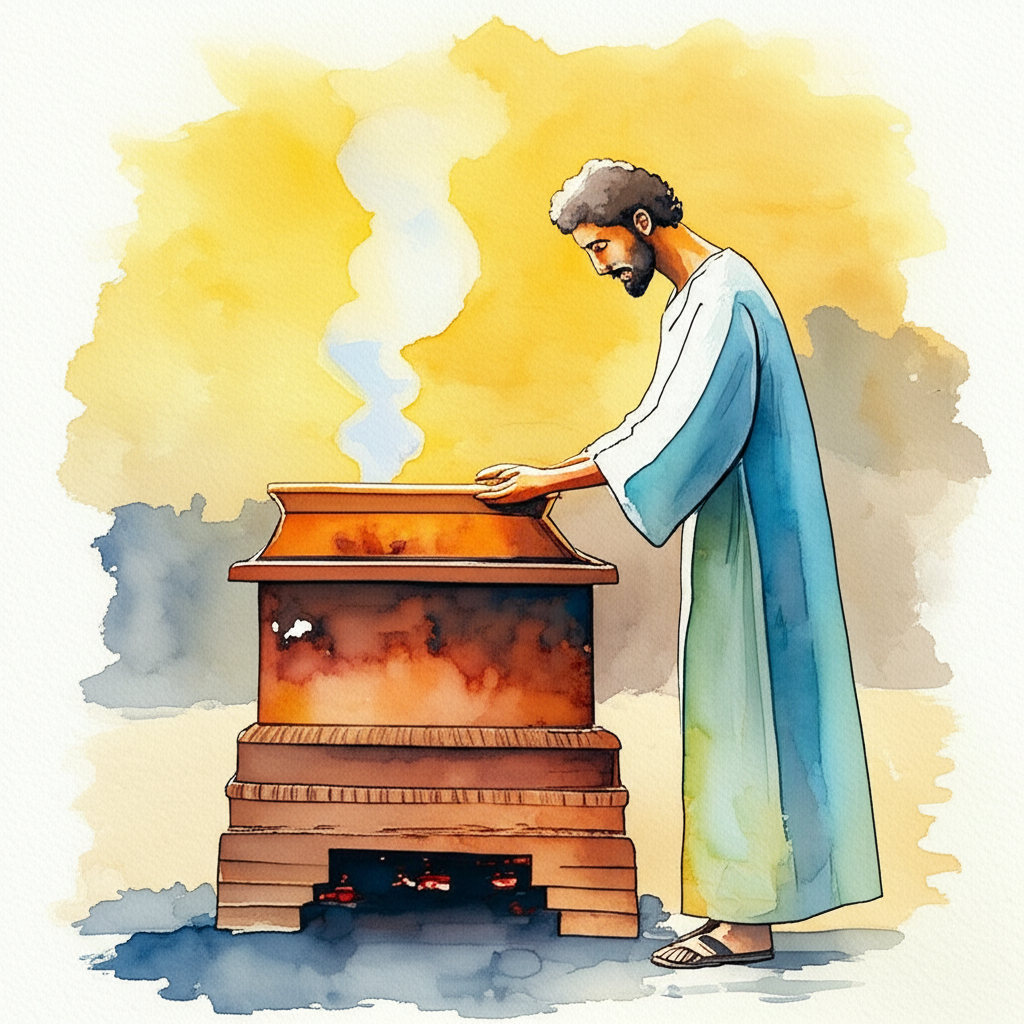
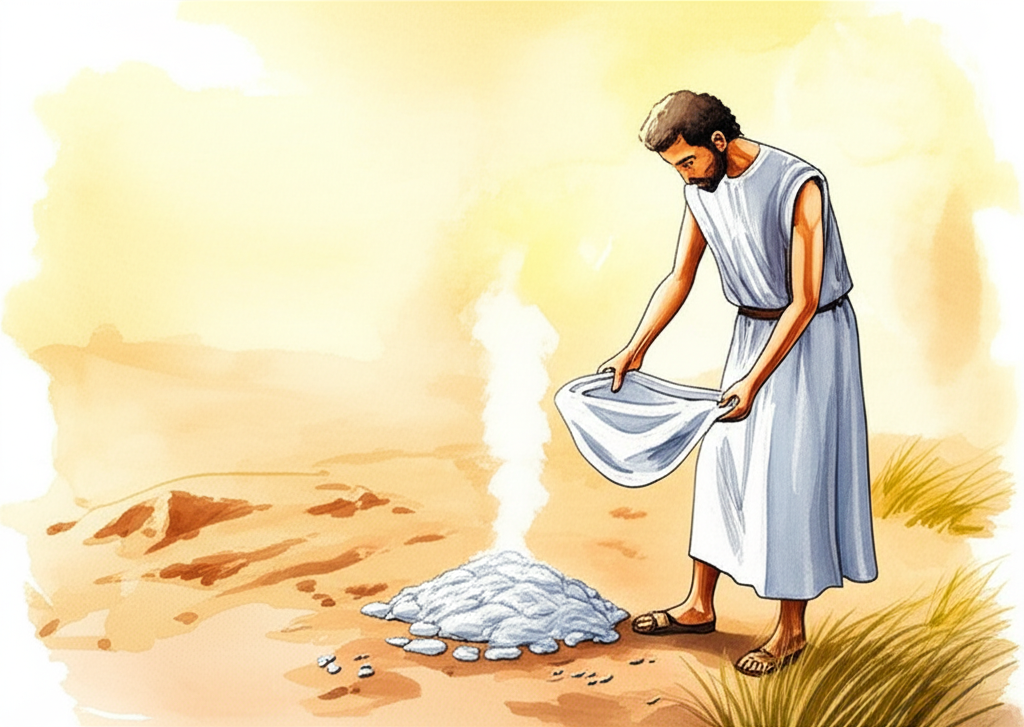
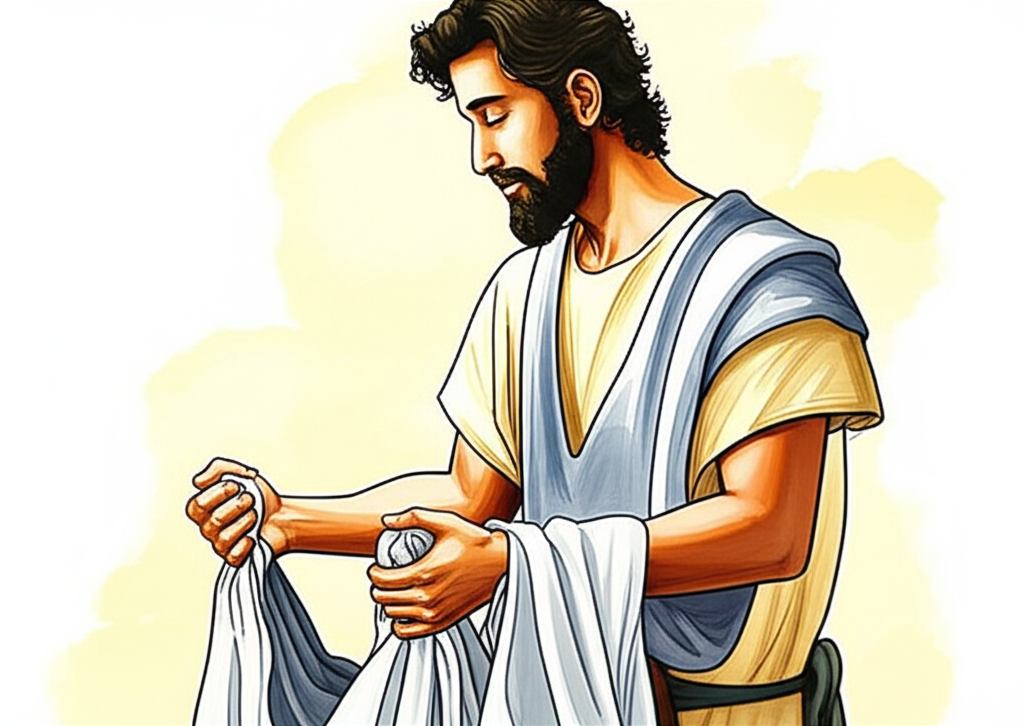
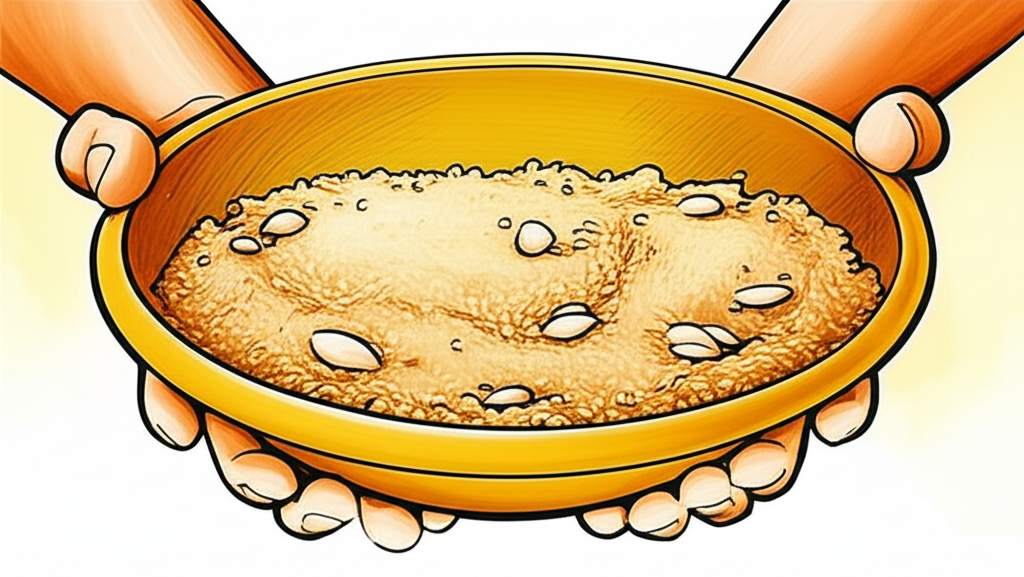
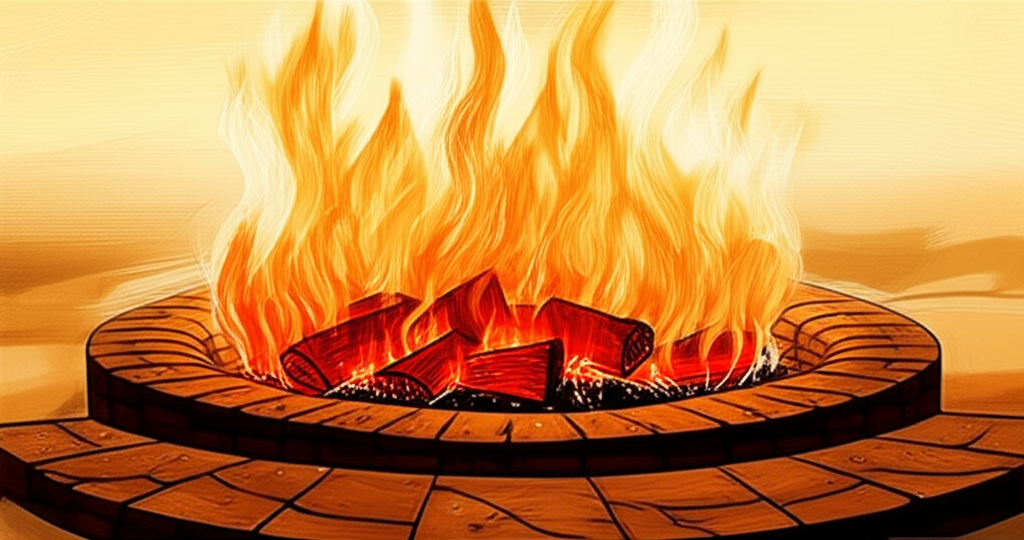
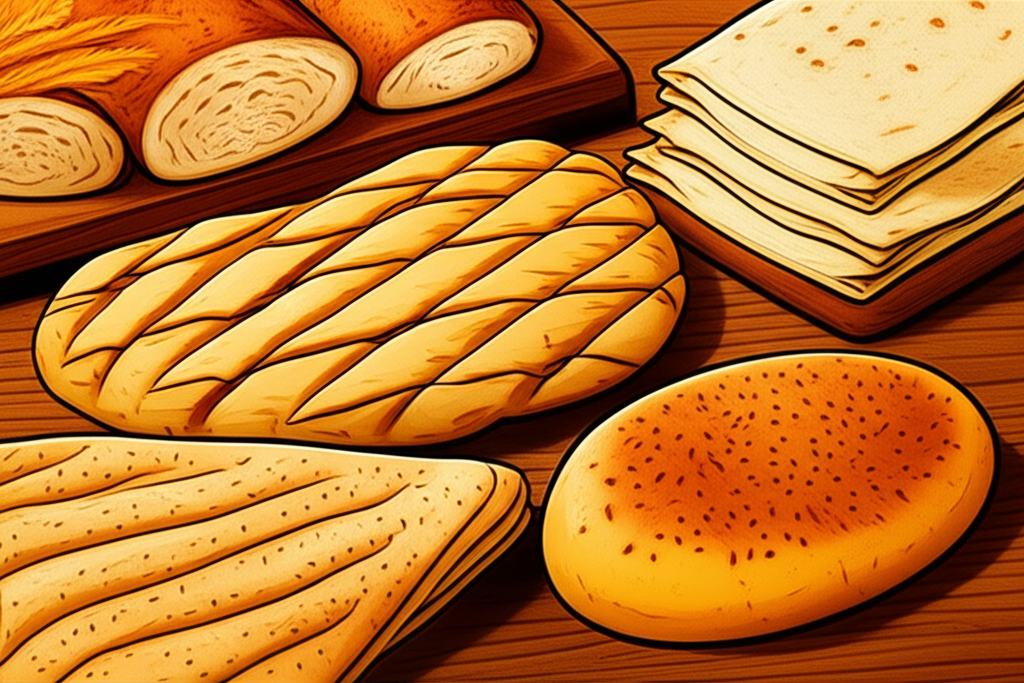

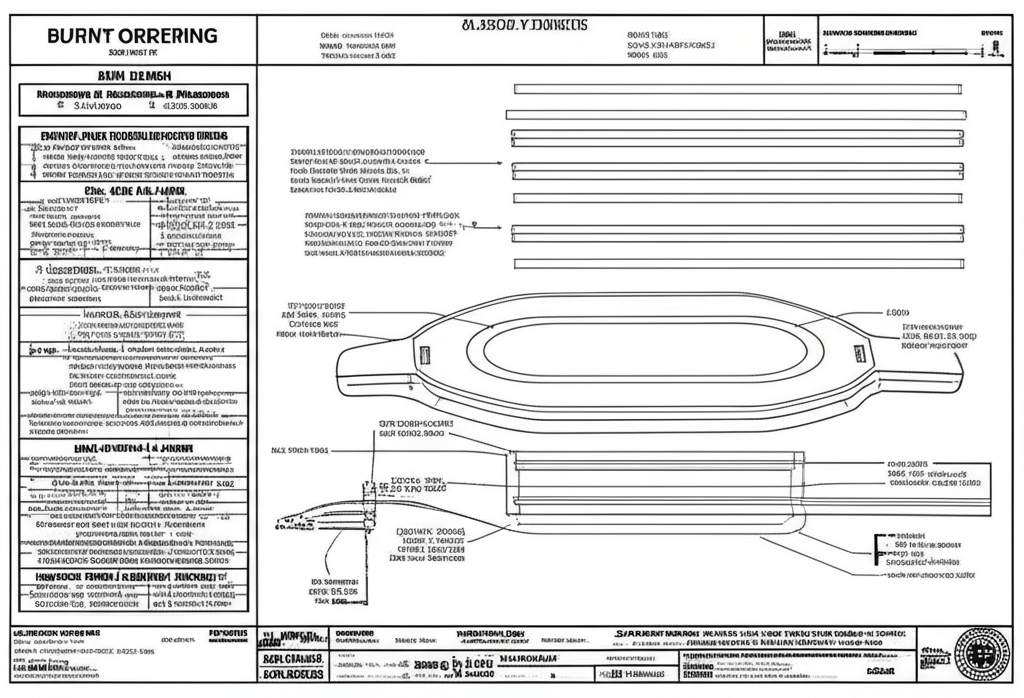
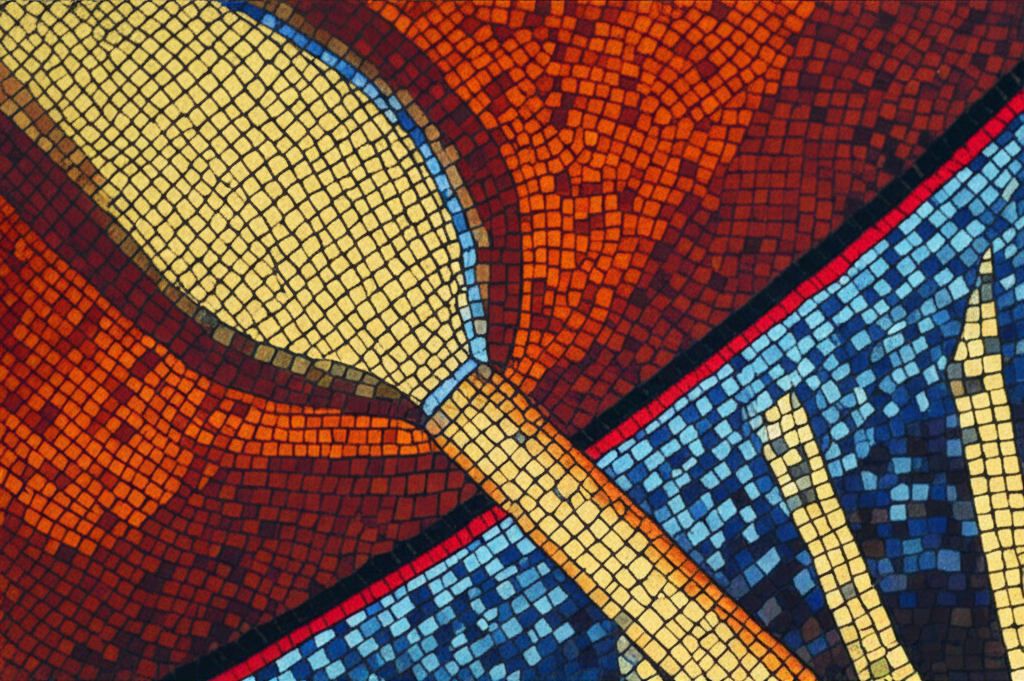
Leviticus chapter 6 kjv
- 1 And the LORD spake unto Moses, saying,
- 2 If a soul sin, and commit a trespass against the LORD, and lie unto his neighbor in that which was delivered him to keep, or in fellowship, or in a thing taken away by violence, or hath deceived his neighbor;
- 3 Or have found that which was lost, and lieth concerning it, and sweareth falsely; in any of all these that a man doeth, sinning therein:
- 4 Then it shall be, because he hath sinned, and is guilty, that he shall restore that which he took violently away, or the thing which he hath deceitfully gotten, or that which was delivered him to keep, or the lost thing which he found,
- 5 Or all that about which he hath sworn falsely; he shall even restore it in the principal, and shall add the fifth part more thereto, and give it unto him to whom it appertaineth, in the day of his trespass offering.
- 6 And he shall bring his trespass offering unto the LORD, a ram without blemish out of the flock, with thy estimation, for a trespass offering, unto the priest:
- 7 And the priest shall make an atonement for him before the LORD: and it shall be forgiven him for any thing of all that he hath done in trespassing therein.
- 8 And the LORD spake unto Moses, saying,
- 9 Command Aaron and his sons, saying, This is the law of the burnt offering: It is the burnt offering, because of the burning upon the altar all night unto the morning, and the fire of the altar shall be burning in it.
- 10 And the priest shall put on his linen garment, and his linen breeches shall he put upon his flesh, and take up the ashes which the fire hath consumed with the burnt offering on the altar, and he shall put them beside the altar.
- 11 And he shall put off his garments, and put on other garments, and carry forth the ashes without the camp unto a clean place.
- 12 And the fire upon the altar shall be burning in it; it shall not be put out: and the priest shall burn wood on it every morning, and lay the burnt offering in order upon it; and he shall burn thereon the fat of the peace offerings.
- 13 The fire shall ever be burning upon the altar; it shall never go out.
- 14 And this is the law of the meat offering: the sons of Aaron shall offer it before the LORD, before the altar.
- 15 And he shall take of it his handful, of the flour of the meat offering, and of the oil thereof, and all the frankincense which is upon the meat offering, and shall burn it upon the altar for a sweet savor, even the memorial of it, unto the LORD.
- 16 And the remainder thereof shall Aaron and his sons eat: with unleavened bread shall it be eaten in the holy place; in the court of the tabernacle of the congregation they shall eat it.
- 17 It shall not be baked with leaven. I have given it unto them for their portion of my offerings made by fire; it is most holy, as is the sin offering, and as the trespass offering.
- 18 All the males among the children of Aaron shall eat of it. It shall be a statute for ever in your generations concerning the offerings of the LORD made by fire: every one that toucheth them shall be holy.
- 19 And the LORD spake unto Moses, saying,
- 20 This is the offering of Aaron and of his sons, which they shall offer unto the LORD in the day when he is anointed; the tenth part of an ephah of fine flour for a meat offering perpetual, half of it in the morning, and half thereof at night.
- 21 In a pan it shall be made with oil; and when it is baked, thou shalt bring it in: and the baked pieces of the meat offering shalt thou offer for a sweet savor unto the LORD.
- 22 And the priest of his sons that is anointed in his stead shall offer it: it is a statute for ever unto the LORD; it shall be wholly burnt.
- 23 For every meat offering for the priest shall be wholly burnt: it shall not be eaten.
- 24 And the LORD spake unto Moses, saying,
- 25 Speak unto Aaron and to his sons, saying, This is the law of the sin offering: In the place where the burnt offering is killed shall the sin offering be killed before the LORD: it is most holy.
- 26 The priest that offereth it for sin shall eat it: in the holy place shall it be eaten, in the court of the tabernacle of the congregation.
- 27 Whatsoever shall touch the flesh thereof shall be holy: and when there is sprinkled of the blood thereof upon any garment, thou shalt wash that whereon it was sprinkled in the holy place.
- 28 But the earthen vessel wherein it is sodden shall be broken: and if it be sodden in a brazen pot, it shall be both scoured, and rinsed in water.
- 29 All the males among the priests shall eat thereof: it is most holy.
- 30 And no sin offering, whereof any of the blood is brought into the tabernacle of the congregation to reconcile withal in the holy place, shall be eaten: it shall be burnt in the fire.
Leviticus chapter 6 nkjv
- 1 And the LORD spoke to Moses, saying:
- 2 "If a person sins and commits a trespass against the LORD by lying to his neighbor about what was delivered to him for safekeeping, or about a pledge, or about a robbery, or if he has extorted from his neighbor,
- 3 or if he has found what was lost and lies concerning it, and swears falsely?in any one of these things that a man may do in which he sins:
- 4 then it shall be, because he has sinned and is guilty, that he shall restore what he has stolen, or the thing which he has extorted, or what was delivered to him for safekeeping, or the lost thing which he found,
- 5 or all that about which he has sworn falsely. He shall restore its full value, add one-fifth more to it, and give it to whomever it belongs, on the day of his trespass offering.
- 6 And he shall bring his trespass offering to the LORD, a ram without blemish from the flock, with your valuation, as a trespass offering, to the priest.
- 7 So the priest shall make atonement for him before the LORD, and he shall be forgiven for any one of these things that he may have done in which he trespasses."
- 8 Then the LORD spoke to Moses, saying,
- 9 "Command Aaron and his sons, saying, 'This is the law of the burnt offering: The burnt offering shall be on the hearth upon the altar all night until morning, and the fire of the altar shall be kept burning on it.
- 10 And the priest shall put on his linen garment, and his linen trousers he shall put on his body, and take up the ashes of the burnt offering which the fire has consumed on the altar, and he shall put them beside the altar.
- 11 Then he shall take off his garments, put on other garments, and carry the ashes outside the camp to a clean place.
- 12 And the fire on the altar shall be kept burning on it; it shall not be put out. And the priest shall burn wood on it every morning, and lay the burnt offering in order on it; and he shall burn on it the fat of the peace offerings.
- 13 A fire shall always be burning on the altar; it shall never go out.
- 14 'This is the law of the grain offering: The sons of Aaron shall offer it on the altar before the LORD.
- 15 He shall take from it his handful of the fine flour of the grain offering, with its oil, and all the frankincense which is on the grain offering, and shall burn it on the altar for a sweet aroma, as a memorial to the LORD.
- 16 And the remainder of it Aaron and his sons shall eat; with unleavened bread it shall be eaten in a holy place; in the court of the tabernacle of meeting they shall eat it.
- 17 It shall not be baked with leaven. I have given it as their portion of My offerings made by fire; it is most holy, like the sin offering and the trespass offering.
- 18 All the males among the children of Aaron may eat it. It shall be a statute forever in your generations concerning the offerings made by fire to the LORD. Everyone who touches them must be holy.' "
- 19 And the LORD spoke to Moses, saying,
- 20 "This is the offering of Aaron and his sons, which they shall offer to the LORD, beginning on the day when he is anointed: one-tenth of an ephah of fine flour as a daily grain offering, half of it in the morning and half of it at night.
- 21 It shall be made in a pan with oil. When it is mixed, you shall bring it in. The baked pieces of the grain offering you shall offer for a sweet aroma to the LORD.
- 22 The priest from among his sons, who is anointed in his place, shall offer it. It is a statute forever to the LORD. It shall be wholly burned.
- 23 For every grain offering for the priest shall be wholly burned. It shall not be eaten."
- 24 Also the LORD spoke to Moses, saying,
- 25 "Speak to Aaron and to his sons, saying, 'This is the law of the sin offering: In the place where the burnt offering is killed, the sin offering shall be killed before the LORD. It is most holy.
- 26 The priest who offers it for sin shall eat it. In a holy place it shall be eaten, in the court of the tabernacle of meeting.
- 27 Everyone who touches its flesh must be holy. And when its blood is sprinkled on any garment, you shall wash that on which it was sprinkled, in a holy place.
- 28 But the earthen vessel in which it is boiled shall be broken. And if it is boiled in a bronze pot, it shall be both scoured and rinsed in water.
- 29 All the males among the priests may eat it. It is most holy.
- 30 But no sin offering from which any of the blood is brought into the tabernacle of meeting, to make atonement in the holy place, shall be eaten. It shall be burned in the fire.
Leviticus chapter 6 niv
- 1 The LORD said to Moses:
- 2 "If anyone sins and is unfaithful to the LORD by deceiving a neighbor about something entrusted to them or left in their care or about something stolen, or if they cheat their neighbor,
- 3 or if they find lost property and lie about it, or if they swear falsely about any such sin that people may commit?
- 4 when they sin in any of these ways and realize their guilt, they must return what they have stolen or taken by extortion, or what was entrusted to them, or the lost property they found,
- 5 or whatever it was they swore falsely about. They must make restitution in full, add a fifth of the value to it and give it all to the owner on the day they present their guilt offering.
- 6 And as a penalty they must bring to the priest, that is, to the LORD, their guilt offering, a ram from the flock, one without defect and of the proper value.
- 7 In this way the priest will make atonement for them before the LORD, and they will be forgiven for any of the things they did that made them guilty."
- 8 The LORD said to Moses:
- 9 "Give Aaron and his sons this command: 'These are the regulations for the burnt offering: The burnt offering is to remain on the altar hearth throughout the night, till morning, and the fire must be kept burning on the altar.
- 10 The priest shall then put on his linen clothes, with linen undergarments next to his body, and shall remove the ashes of the burnt offering that the fire has consumed on the altar and place them beside the altar.
- 11 Then he is to take off these clothes and put on others, and carry the ashes outside the camp to a place that is ceremonially clean.
- 12 The fire on the altar must be kept burning; it must not go out. Every morning the priest is to add firewood and arrange the burnt offering on the fire and burn the fat of the fellowship offerings on it.
- 13 The fire must be kept burning on the altar continuously; it must not go out.
- 14 "?'These are the regulations for the grain offering: Aaron's sons are to bring it before the LORD, in front of the altar.
- 15 The priest is to take a handful of the finest flour and some olive oil, together with all the incense on the grain offering, and burn the memorial portion on the altar as an aroma pleasing to the LORD.
- 16 Aaron and his sons shall eat the rest of it, but it is to be eaten without yeast in the sanctuary area; they are to eat it in the courtyard of the tent of meeting.
- 17 It must not be baked with yeast; I have given it as their share of the food offerings presented to me. Like the sin offering and the guilt offering, it is most holy.
- 18 Any male descendant of Aaron may eat it. For all generations to come it is his perpetual share of the food offerings presented to the LORD. Whatever touches them will become holy.'?"
- 19 The LORD also said to Moses,
- 20 "This is the offering Aaron and his sons are to bring to the LORD on the day he is anointed: a tenth of an ephah of the finest flour as a regular grain offering, half of it in the morning and half in the evening.
- 21 It must be prepared with oil on a griddle; bring it well-mixed and present the grain offering broken in pieces as an aroma pleasing to the LORD.
- 22 The son who is to succeed him as anointed priest shall prepare it. It is the LORD's perpetual share and is to be burned completely.
- 23 Every grain offering of a priest shall be burned completely; it must not be eaten."
- 24 The LORD said to Moses,
- 25 "Say to Aaron and his sons: 'These are the regulations for the sin offering: The sin offering is to be slaughtered before the LORD in the place the burnt offering is slaughtered; it is most holy.
- 26 The priest who offers it shall eat it; it is to be eaten in the sanctuary area, in the courtyard of the tent of meeting.
- 27 Whatever touches any of the flesh will become holy, and if any of the blood is spattered on a garment, you must wash it in the sanctuary area.
- 28 The clay pot the meat is cooked in must be broken; but if it is cooked in a bronze pot, the pot is to be scoured and rinsed with water.
- 29 Any male in a priest's family may eat it; it is most holy.
- 30 But any sin offering whose blood is brought into the tent of meeting to make atonement in the Holy Place must not be eaten; it must be burned up.
Leviticus chapter 6 esv
- 1 The LORD spoke to Moses, saying,
- 2 "If anyone sins and commits a breach of faith against the LORD by deceiving his neighbor in a matter of deposit or security, or through robbery, or if he has oppressed his neighbor
- 3 or has found something lost and lied about it, swearing falsely ? in any of all the things that people do and sin thereby ?
- 4 if he has sinned and has realized his guilt and will restore what he took by robbery or what he got by oppression or the deposit that was committed to him or the lost thing that he found
- 5 or anything about which he has sworn falsely, he shall restore it in full and shall add a fifth to it, and give it to him to whom it belongs on the day he realizes his guilt.
- 6 And he shall bring to the priest as his compensation to the LORD a ram without blemish out of the flock, or its equivalent, for a guilt offering.
- 7 And the priest shall make atonement for him before the LORD, and he shall be forgiven for any of the things that one may do and thereby become guilty."
- 8 The LORD spoke to Moses, saying,
- 9 "Command Aaron and his sons, saying, This is the law of the burnt offering. The burnt offering shall be on the hearth on the altar all night until the morning, and the fire of the altar shall be kept burning on it.
- 10 And the priest shall put on his linen garment and put his linen undergarment on his body, and he shall take up the ashes to which the fire has reduced the burnt offering on the altar and put them beside the altar.
- 11 Then he shall take off his garments and put on other garments and carry the ashes outside the camp to a clean place.
- 12 The fire on the altar shall be kept burning on it; it shall not go out. The priest shall burn wood on it every morning, and he shall arrange the burnt offering on it and shall burn on it the fat of the peace offerings.
- 13 Fire shall be kept burning on the altar continually; it shall not go out.
- 14 "And this is the law of the grain offering. The sons of Aaron shall offer it before the LORD in front of the altar.
- 15 And one shall take from it a handful of the fine flour of the grain offering and its oil and all the frankincense that is on the grain offering and burn this as its memorial portion on the altar, a pleasing aroma to the LORD.
- 16 And the rest of it Aaron and his sons shall eat. It shall be eaten unleavened in a holy place. In the court of the tent of meeting they shall eat it.
- 17 It shall not be baked with leaven. I have given it as their portion of my food offerings. It is a thing most holy, like the sin offering and the guilt offering.
- 18 Every male among the children of Aaron may eat of it, as decreed forever throughout your generations, from the LORD's food offerings. Whatever touches them shall become holy."
- 19 The LORD spoke to Moses, saying,
- 20 "This is the offering that Aaron and his sons shall offer to the LORD on the day when he is anointed: a tenth of an ephah of fine flour as a regular grain offering, half of it in the morning and half in the evening.
- 21 It shall be made with oil on a griddle. You shall bring it well mixed, in baked pieces like a grain offering, and offer it for a pleasing aroma to the LORD.
- 22 The priest from among Aaron's sons, who is anointed to succeed him, shall offer it to the LORD as decreed forever. The whole of it shall be burned.
- 23 Every grain offering of a priest shall be wholly burned. It shall not be eaten."
- 24 The LORD spoke to Moses, saying,
- 25 "Speak to Aaron and his sons, saying, This is the law of the sin offering. In the place where the burnt offering is killed shall the sin offering be killed before the LORD; it is most holy.
- 26 The priest who offers it for sin shall eat it. In a holy place it shall be eaten, in the court of the tent of meeting.
- 27 Whatever touches its flesh shall be holy, and when any of its blood is splashed on a garment, you shall wash that on which it was splashed in a holy place.
- 28 And the earthenware vessel in which it is boiled shall be broken. But if it is boiled in a bronze vessel, that shall be scoured and rinsed in water.
- 29 Every male among the priests may eat of it; it is most holy.
- 30 But no sin offering shall be eaten from which any blood is brought into the tent of meeting to make atonement in the Holy Place; it shall be burned up with fire.
Leviticus chapter 6 nlt
- 1 Then the LORD said to Moses,
- 2 "Suppose one of you sins against your associate and is unfaithful to the LORD. Suppose you cheat in a deal involving a security deposit, or you steal or commit fraud,
- 3 or you find lost property and lie about it, or you lie while swearing to tell the truth, or you commit any other such sin.
- 4 If you have sinned in any of these ways, you are guilty. You must give back whatever you stole, or the money you took by extortion, or the security deposit, or the lost property you found,
- 5 or anything obtained by swearing falsely. You must make restitution by paying the full price plus an additional 20 percent to the person you have harmed. On the same day you must present a guilt offering.
- 6 As a guilt offering to the LORD, you must bring to the priest your own ram with no defects, or you may buy one of equal value.
- 7 Through this process, the priest will purify you before the LORD, making you right with him, and you will be forgiven for any of these sins you have committed."
- 8 Then the LORD said to Moses,
- 9 "Give Aaron and his sons the following instructions regarding the burnt offering. The burnt offering must be left on top of the altar until the next morning, and the fire on the altar must be kept burning all night.
- 10 In the morning, after the priest on duty has put on his official linen clothing and linen undergarments, he must clean out the ashes of the burnt offering and put them beside the altar.
- 11 Then he must take off these garments, change back into his regular clothes, and carry the ashes outside the camp to a place that is ceremonially clean.
- 12 Meanwhile, the fire on the altar must be kept burning; it must never go out. Each morning the priest will add fresh wood to the fire and arrange the burnt offering on it. He will then burn the fat of the peace offerings on it.
- 13 Remember, the fire must be kept burning on the altar at all times. It must never go out.
- 14 "These are the instructions regarding the grain offering. Aaron's sons must present this offering to the LORD in front of the altar.
- 15 The priest on duty will take from the grain offering a handful of the choice flour moistened with olive oil, together with all the frankincense. He will burn this representative portion on the altar as a pleasing aroma to the LORD.
- 16 Aaron and his sons may eat the rest of the flour, but it must be baked without yeast and eaten in a sacred place within the courtyard of the Tabernacle.
- 17 Remember, it must never be prepared with yeast. I have given it to the priests as their share of the special gifts presented to me. Like the sin offering and the guilt offering, it is most holy.
- 18 Any of Aaron's male descendants may eat from the special gifts presented to the LORD. This is their permanent right from generation to generation. Anyone or anything that touches these offerings will become holy."
- 19 Then the LORD said to Moses,
- 20 "On the day Aaron and his sons are anointed, they must present to the LORD the standard grain offering of two quarts of choice flour, half to be offered in the morning and half to be offered in the evening.
- 21 It must be carefully mixed with olive oil and cooked on a griddle. Then slice this grain offering and present it as a pleasing aroma to the LORD.
- 22 In each generation, the high priest who succeeds Aaron must prepare this same offering. It belongs to the LORD and must be burned up completely. This is a permanent law.
- 23 All such grain offerings of a priest must be burned up entirely. None of it may be eaten."
- 24 Then the LORD said to Moses,
- 25 "Give Aaron and his sons the following instructions regarding the sin offering. The animal given as an offering for sin is a most holy offering, and it must be slaughtered in the LORD's presence at the place where the burnt offerings are slaughtered.
- 26 The priest who offers the sacrifice as a sin offering must eat his portion in a sacred place within the courtyard of the Tabernacle.
- 27 Anyone or anything that touches the sacrificial meat will become holy. If any of the sacrificial blood spatters on a person's clothing, the soiled garment must be washed in a sacred place.
- 28 If a clay pot is used to boil the sacrificial meat, it must then be broken. If a bronze pot is used, it must be scoured and thoroughly rinsed with water.
- 29 Any male from a priest's family may eat from this offering; it is most holy.
- 30 But the offering for sin may not be eaten if its blood was brought into the Tabernacle as an offering for purification in the Holy Place. It must be completely burned with fire.
- Bible Book of Leviticus
- 1 Laws for Burnt Offerings
- 2 Laws for Grain Offerings
- 3 Laws for Peace Offerings
- 4 Sacrifies for Sin
- 5 Laws for Guilt Offerings
- 6 The Priests and the Offerings
- 7 Law of the trespass offering
- 8 Consecration of Aaron and His Sons
- 9 The Lord Accepts Aaron's Offering
- 10 The Death of Nadab and Abihu
- 11 Clean and unclean Animals
- 12 Purification After Childbirth
- 13 Laws About Leprosy
- 14 Laws for Cleansing Lepers
- 15 Sperm Discharge and Menstruation cycle
- 16 Day of Atonement
- 17 The Place of Sacrifice
- 18 Unlawful Sexual Relations
- 19 Levitical Laws for Levites
- 20 Punishment for Child Sacrifice
- 21 Holiness and the Priests
- 22 Acceptable Offerings
- 23 The Feasts of the Lord
- 24 The Lamps
- 25 Year of Jubilee
- 26 Blessings for Obedience
- 27 Laws About Vows